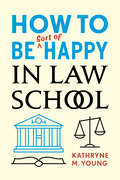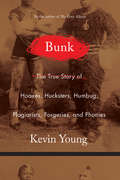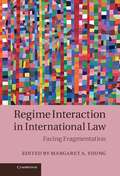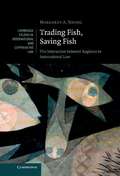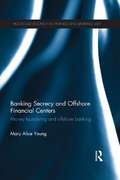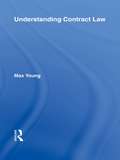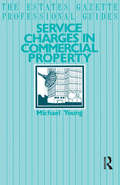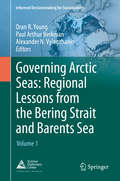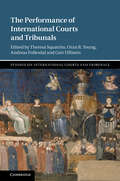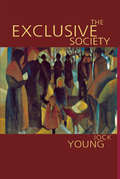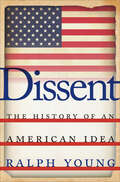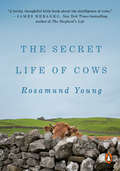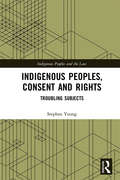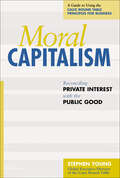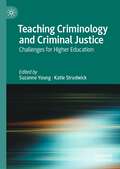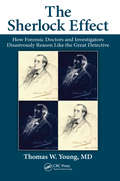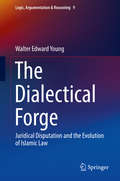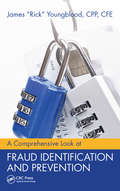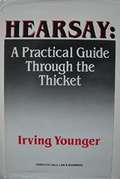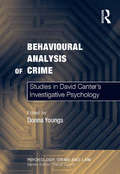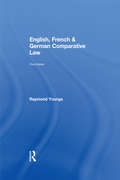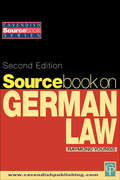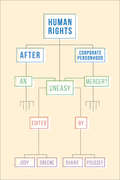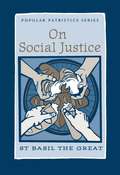- Table View
- List View
How to Be Sort of Happy in Law School
by Kathryne M. YoungEach year, over 40,000 new students enter America's law schools. Each new crop experiences startlingly high rates of depression, anxiety, fatigue, and dissatisfaction. Kathryne M. Young was one of those disgruntled law students. After finishing law school (and a PhD), she set out to learn more about the law school experience and how to improve it for future students. Young conducted one of the most ambitious studies of law students ever undertaken, charting the experiences of over 1000 law students from over 100 different law schools, along with hundreds of alumni, dropouts, law professors, and more. How to Be Sort of Happy in Law School is smart, compelling, and highly readable. Combining her own observations and experiences with the results of her study and the latest sociological research on law schools, Young offers a very different take from previous books about law school survival. Instead of assuming her readers should all aspire to law-review-and-big-firm notions of success, Young teaches students how to approach law school on their own terms: how to tune out the drumbeat of oppressive expectations and conventional wisdom to create a new breed of law school experience altogether. Young provides readers with practical tools for finding focus, happiness, and a sense of purpose while facing the seemingly endless onslaught of problems law school presents daily. This book is an indispensable companion for today's law students, prospective law students, and anyone who cares about making law students' lives better. Bursting with warmth, realism, and a touch of firebrand wit, How to Be Sort of Happy in Law School equips law students with much-needed wisdom for thriving during those three crucial years.
Bunk: The Rise of Hoaxes, Humbug, Plagiarists, Phonies, Post-Facts, and Fake News
by Kevin YoungLonglisted for the National Book Award for Nonfiction“There Kevin Young goes again, giving us books we greatly need, cleverly disguised as books we merely want. Unexpectedly essential.”—Marlon JamesAward-winning poet and critic Kevin Young tours us through a rogue’s gallery of hoaxers, plagiarists, forgers, and fakers—from the humbug of P. T. Barnum and Edgar Allan Poe to the unrepentant bunk of JT LeRoy and Donald J. Trump. Bunk traces the history of the hoax as a peculiarly American phenomenon, examining what motivates hucksters and makes the rest of us so gullible. Disturbingly, Young finds that fakery is woven from stereotype and suspicion, race being the most insidious American hoax of all. He chronicles how Barnum came to fame by displaying figures like Joice Heth, a black woman whom he pretended was the 161-year-old nursemaid to George Washington, and What Is It?, an African American man Barnum professed was a newly discovered missing link in evolution.Bunk then turns to the hoaxing of history and the ways that forgers, plagiarists, and journalistic fakers invent backstories and falsehoods to sell us lies about themselves and about the world in our own time, from pretend Native Americans Grey Owl and Nasdijj to the deadly imposture of Clark Rockefeller, from the made-up memoirs of James Frey to the identity theft of Rachel Dolezal. In this brilliant and timely work, Young asks what it means to live in a post-factual world of “truthiness” where everything is up for interpretation and everyone is subject to a pervasive cynicism that damages our ideas of reality, fact, and art.
Regime Interaction in International Law
by Margaret A. YoungThis major extension of existing scholarship on the fragmentation of international law utilises the concept of 'regimes' from international law and international relations literature to define functional areas such as human rights or trade law. Responding to existing approaches, which focus on the resolution of conflicting norms between regimes, it contains a variety of critical, sociological and doctrinal perspectives on regime interaction. Leading international law scholars and practitioners reflect on how, in situations of diversity and concurrent activity, such interaction shapes and controls knowledge and norms in often hegemonic ways. The contributors draw on topical examples of interacting regimes, including climate, trade and investment regimes, to argue for new methods of regime interaction. Together, the essays combine approaches from international, transnational and comparative constitutional law to provide important insights into an issue that continues to challenge international legal theory and practice.
Trading Fish, Saving Fish
by Margaret A. YoungNumerous international legal regimes now seek to address the global depletion of fish stocks, and increasingly their activities overlap. The relevant laws were developed at different times by different groups of states. They are motivated by divergent economic approaches, influenced by disparate non-state actors, and implemented by separate institutions such as the World Trade Organisation and the United Nations Food and Agriculture Organisation. Margaret Young shows how these and other factors affect the interaction between regimes. Her empirical and doctrinal analysis moves beyond the discussion of conflicting norms that has dominated the fragmentation debate. Case-studies include the negotiation of new rules on fisheries subsidies, the restriction of trade in endangered marine species and the adjudication of fisheries import bans. She explores how regimes should interact, in fisheries governance and beyond, to offer insights into the practice and legitimacy of regime interaction in international law.
Banking Secrecy and Offshore Financial Centers: Money laundering and offshore banking (Routledge Research in Finance and Banking Law)
by Mary Alice YoungThis book brings together the issues surrounding banking secrecy and confiscation of criminal proceeds. The book examines the existing legal agreements at the international, regional and national levels and their interaction in the substantive areas of confiscation, anti-money laundering and banking confidentiality laws. It looks at how these agreements have been applied in offshore financial centers and demonstrates that despite a number of legally binding UN Conventions as well as global anti-money laundering recommendations, the implementation of them is often lukewarm by those Parties who have ratified the Convention and adopted obligations, because of this the confiscation legislation is incompatible with strict banking confidentiality laws. The work draws on the experience of criminologists to offer critical insight into the legislative frameworks designed to deal with banking secrecy and confiscation in offshore financial centers. It goes on to offer suggestions for measures that may be taken by major economies to circumvent the lack of cooperation by offshore financial centers as intolerance towards money laundering grows in light of recent political and economic events. This book will be of particular interest to students and scholars of Law, Finance and Criminology.
Understanding Contract Law
by Max YoungUnderstanding Contract Law offers a clear introduction to the basic concepts of contract law in England. Built around familiar real-world examples that illustrate the concepts, principles and key cases upon which English contract law is structured, Understanding Contract Law is an ideal guide for those approaching an undergraduate law degree, or for general readers interested in this fundamental area of the law. This concise, student-friendly overview, supported by chapter introductions and summaries throughout, covers the fundamental topics in English contract law, including: Agreement and Offer Acceptance Certainty Consideration Privity Misrepresentation.
Service Charges in Commercial Properties
by Michael YoungFirst Published in 1990. Routledge is an imprint of Taylor & Francis, an informa company.
Governing Arctic Seas: Volume 1 (Informed Decisionmaking for Sustainability)
by Oran R. Young Paul Arthur Berkman Alexander N. VylegzhaninGoverning Arctic Seas introduces the concept of ecopolitical regions, using in-depth analyses of the Bering Strait and Barents Sea Regions to demonstrate how integrating the natural sciences, social sciences and Indigenous knowledge can reveal patterns, trends and processes as the basis for informed decisionmaking. This book draws on international, interdisciplinary and inclusive (holistic) perspectives to analyze governance mechanisms, built infrastructure and their coupling to achieve sustainability in biophysical regions subject to shared authority. Governing Arctic Seas is the first volume in a series of books on Informed Decisionmaking for Sustainability that apply, train and refine science diplomacy to address transboundary issues at scales ranging from local to global. For nations and peoples as well as those dealing with global concerns, this holistic process operates across a ‘continuum of urgencies’ from security time scales (mitigating risks of political, economic and cultural instabilities that are immediate) to sustainability time scales (balancing economic prosperity, environmental protection and societal well-being across generations). Informed decisionmaking is the apex goal, starting with questions that generate data as stages of research, integrating decisionmaking institutions to employ evidence to reveal options (without advocacy) that contribute to informed decisions. The first volumes in the series focus on the Arctic, revealing legal, economic, environmental and societal lessons with accelerating knowledge co-production to achieve progress with sustainability in this globally-relevant region that is undergoing an environmental state change in the sea and on land. Across all volumes, there is triangulation to integrate research, education and leadership as well as science, technology and innovation to elaborate the theory, methods and skills of informed decisionmaking to build common interests for the benefit of all on Earth.
The Performance of International Courts and Tribunals (Studies on International Courts and Tribunals)
by Oran R. Young Geir Ulfstein Theresa Squatrito Andreas FollesdalInternational courts and tribunals now operate globally and in several world regions, playing significant roles in international law and global governance. However, these courts vary significantly in terms of their practices, procedures, and the outcomes they produce.<P><P> Why do some international courts perform better than others? Which factors affect the outcome of these courts and tribunals? <P>The Performance of International Courts and Tribunals is an interdisciplinary study featuring approaches, methods and authorship from law and political science, which proposes the concept of performance to describe the processes and outcomes of international courts. It develops a framework for evaluating and explaining performance by offering a broad comparative analysis of international courts, covering several world regions and the areas of trade, investment, the environment, human rights and criminal law, and offers interdisciplinary accounts to explain how and why international court performance varies.<P>Features approaches, methods and authorship from law and political science.<P> Introduces a framework for evaluating performance of international courts and tribunals.<P> Offers original interdisciplinary perspectives.<P>
The Exclusive Society: Social Exclusion, Crime and Difference in Late Modernity
by Professor Jock YoungIn this major new work, which Zygmunt Bauman calls a 'tour de force of breathtaking erudition and clarity', Jock Young charts the movement of the social fabric in the last third of the twenthieth century from an inclusive society of stability and homogeneity to an exclusive society of change and division. Jock Young, one of the foremost criminologists of our time, explores exclusion on three levels: economic exclusion from the labour market; social exclusion between people in civil society; and the ever-expanding exclusionary activities of the criminal justice system. Taking account of the massive dramatic structural and cultural changes that have beset our society and relating these to the quantum leap in crime and incivilities, Jock Young develops a major new theory based on a new citizenship and a reflexive modernity.
Dissent: The History of an American Idea
by Ralph YoungFinalist, 2016 Ralph Waldo Emerson AwardOne of Bustle's Books For Your Civil Disobedience Reading List Examines the key role dissent has played in shaping the United States, emphasizing the way Americans responded to injusticesDissent: The History of an American Idea examines the key role dissent has played in shaping the United States. It focuses on those who, from colonial days to the present, dissented against the ruling paradigm of their time: from the Puritan Anne Hutchinson and Native American chief Powhatan in the seventeenth century, to the Occupy and Tea Party movements in the twenty-first century. The emphasis is on the way Americans, celebrated figures and anonymous ordinary citizens, responded to what they saw as the injustices that prevented them from fully experiencing their vision of America. At its founding the United States committed itself to lofty ideals. When the promise of those ideals was not fully realized by all Americans, many protested and demanded that the United States live up to its promise. Women fought for equal rights; abolitionists sought to destroy slavery; workers organized unions; Indians resisted white encroachment on their land; radicals angrily demanded an end to the dominance of the moneyed interests; civil rights protestors marched to end segregation; antiwar activists took to the streets to protest the nation’s wars; and reactionaries, conservatives, and traditionalists in each decade struggled to turn back the clock to a simpler, more secure time. Some dissenters are celebrated heroes of American history, while others are ordinary people: frequently overlooked, but whose stories show that change is often accomplished through grassroots activism. The United States is a nation founded on the promise and power of dissent. In this stunningly comprehensive volume, Ralph Young shows us its history.
The Secret Life of Cows
by Rosamund Young"Within a day of receiving this book, I had consumed it... Absorbing, moving, and compulsively readable."—Lydia DavisIn this affectionate, heart-warming chronicle, Rosamund Young distills a lifetime of organic farming wisdom, describing the surprising personalities of her cows and other animalsAt her famous Kite's Nest Farm in Worcestershire, England, the cows (as well as sheep, hens, and pigs) all roam free. They make their own choices about rearing, grazing, and housing. Left to be themselves, the cows exhibit temperaments and interests as diverse as our own. "Fat Hat" prefers men to women; "Chippy Minton" refuses to sleep with muddy legs and always reports to the barn for grooming before bed; "Jake" has a thing for sniffing the carbon monoxide fumes of the Land Rover exhaust pipe; and "Gemima" greets all humans with an angry shake of the head and is fiercely independent.An organic farmer for decades, Young has an unaffected and homely voice. Her prose brims with genuine devotion to the wellbeing of animals. Most of us never apprehend the various inner lives animals possess, least of all those that we might eat. But Young has spent countless hours observing how these creatures love, play games, and form life-long friendships. She imparts hard-won wisdom about the both moral and real-world benefits of organic farming. (If preserving the dignity of animals isn't a good enough reason for you, consider how badly factory farming stunts the growth of animals, producing unhealthy and tasteless food.)This gorgeously-illustrated book, which includes an original introduction by the legendary British playwright Alan Bennett, is the summation of a life's work, and a delightful and moving tribute to the deep richness of animal sentience.
Hong Kong's Court of Final Appeal
by Simon N. M. Young Yash GhaiIn the years since it was established on 1 July 1997, Hong Kong's Court of Final Appeal has developed a distinctive body of new law and doctrine with the help of eminent foreign common law judges. Under the leadership of Chief Justice Andrew Li, it has also remained independent under Chinese sovereignty and become a model for other Asian final courts working to maintain the rule of law, judicial independence and professionalism in challenging political environments. In this book, leading practitioners, jurists and academics examine the Court's history, operation and jurisprudence, and provide a comparative analysis with European courts and China's other autonomous final court in Macau. It also makes use of extensive empirical data compiled from the jurisprudence to illuminate the Court's decision-making processes and identify the relative impacts of the foreign and local judges.
Indigenous Peoples, Consent and Rights: Troubling Subjects (Indigenous Peoples and the Law)
by Stephen YoungAnalysing how Indigenous Peoples come to be identifiable as bearers of human rights, this book considers how individuals and communities claim the right of free, prior and informed consent (FPIC) as Indigenous peoples. The basic notion of FPIC is that states should seek Indigenous peoples’ consent before taking actions that will have an impact on them, their territories or their livelihoods. FPIC is an important development for Indigenous peoples, their advocates and supporters because one might assume that, where states recognize it, Indigenous peoples will have the ability to control how non-Indigenous laws and actions will affect them. But who exactly are the Indigenous peoples that are the subjects of this discourse? This book argues that the subject status of Indigenous peoples emerged out of international law in the late 1970s and early 1980s. Then, through a series of case studies, it considers how self-identifying Indigenous peoples, scholars, UN institutions and non-government organizations (NGOs) dispersed that subject-status and associated rights discourse through international and national legal contexts. It shows that those who claim international human rights as Indigenous peoples performatively become identifiable subjects of international law – but further demonstrates that this does not, however, provide them with control over, or emancipation from, a state-based legal system. Maintaining that the discourse on Indigenous peoples and international law itself needs to be theoretically and critically re-appraised, this book problematises the subject-status of those who claim Indigenous peoples’ rights and the role of scholars, institutions, NGOs and others in producing that subject-status. Squarely addressing the limitations of international human rights law, it nevertheless goes on to provide a conceptual framework for rethinking the promise and power of Indigenous peoples’ rights. Original and sophisticated, the book will appeal to scholars, activists and lawyers involved with indigenous rights, as well as those with more general interests in the operation of international law.
Moral Capitalism: Reconciling Private Interest with the Public Good
by Stephen YoungShows how to ensure that capitalism promotes progress and equality rather than enriching the few at the expense of many Based on principles developed by the Caux Round Table, an international network of senior business executives from such companies as 3M, Canon, NEC, Bankers Trust, Shell, Prudential, and dozens of other companies Provides practical guidelines for corporate social responsibility through the Caux Round Table's Seven General Principles for Business The world is drifting without a clear plan for its economic development. Communism is dead, but in the wake of Enron and similar scandals, many see capitalism as amoral and too easily abused. A blueprint for progress is needed and Moral Capitalism provides one. Moral Capitalism is based on principles developed by the Caux Round Table, an extraordinary international network of top business executives who believe that business can-and must-weigh both profit and principle. Caux Round Table's global chair, Stephen Young, argues that the ethical standards inherent in capitalism have been compromised by cultural values inimical to capitalism's essentially egalitarian, rational spirit, and distorted by the short-sighted dog-eat-dog doctrines of social Darwinism into what he calls brute capitalism. He demonstrates how the Caux Round Table's Seven General Principles for Business can serve as a blueprint for a new moral capitalism, and explores in detail how, if guided by these principles, capitalism is really the only system with the potential to reduce global poverty and tyranny and address the needs and aspirations of individuals, societies, and nations.
Teaching Criminology and Criminal Justice: Challenges for Higher Education
by Suzanne Young Katie StrudwickThis book addresses the challenges within teaching Criminology and Criminal Justice, for students studying and academics involved in designing and delivering courses at an undergraduate and postgraduate level. The book highlights a number of contemporary issues through a wide context of themes and reflections of practice. The chapters are arranged in thematic parts: firstly ‘the challenges of diversity and inclusion’ secondly ‘challenges of creating authentic learning environments', and lastly ‘the challenge of creating transformative conversation’. These themes discuss different teaching approaches and present materials which address questions relevant for meeting the challenges. The book focuses on the role and impact of teaching Criminology and Criminal Justice in the real world and explores debates which have autonomy in their questioning and overlapping themes. The narratives reflect upon others’ experiences and explore transformative learning and innovation in Criminology and Criminal Justice.
The Sherlock Effect: How Forensic Doctors and Investigators Disastrously Reason Like the Great Detective
by Thomas W. YoungForensic science is in crisis and at a cross-roads. Movies and television dramas depict forensic heroes with high-tech tools and dazzling intellects who—inside an hour, notwithstanding commercials—piece together past-event puzzles from crime scenes and autopsies. Likewise, Sherlock Holmes—the iconic fictional detective, and the invention of forensic doctor Sir Arthur Conan Doyle—is held up as a paragon of forensic and scientific inspiration—does not "reason forward" as most people do, but "reasons backwards." Put more plainly, rather than learning the train of events and seeing whether the resultant clues match those events, Holmes determines what happened in the past by looking at the clues. Impressive and infallible as this technique appears to be—it must be recognized that infallibility lies only in works of fiction. Reasoning backward does not work in real life: reality is far less tidy. In courtrooms everywhere, innocent people pay the price of life imitating art, of science following detective fiction. In particular, this book looks at the long and disastrous shadow cast by that icon of deductive reasoning, Sherlock Holmes. In The Sherlock Effect, author Dr. Thomas W. Young shows why this Sherlock-Holmes-style reasoning does not work and, furthermore, how it can—and has led—to wrongful convictions. Dr. Alan Moritz, one of the early pioneers of forensic pathology in the United States, warned his colleagues in the 1950’s about making the Sherlock Holmes error. Little did Moritz realize how widespread the problem would eventually become, involving physicians in all other specialties of medicine and not just forensic pathologists. Dr. Young traces back how this situation evolved, looking back over the history of forensic medicine, revealing the chilling degree to which forensic experts fail us every day. While Dr. Young did not want to be the one to write this book, he has felt compelled in the interest of science and truth. This book is measured, well-reasoned, accessible, insightful, and—above all—compelling. As such, it is a must-read treatise for forensic doctors, forensic practitioners and students, judges, lawyers adjudicating cases in court, and anyone with an interest in forensic science.
The Dialectical Forge
by Walter Edward YoungThe Dialectical Forge identifies dialectical disputation (jadal) as a primary formative dynamic in the evolution of pre-modern Islamic legal systems, promoting dialectic from relative obscurity to a more appropriate position at the forefront of Islamic legal studies. The author introduces and develops a dialectics-based analytical method for the study of pre-modern Islamic legal argumentation, examines parallels and divergences between Aristotelian dialectic and early juridical jadal-theory, and proposes a multi-component paradigm--the Dialectical Forge Model--to account for the power of jadal in shaping Islamic law and legal theory. In addition to overviews of current evolutionary narratives for Islamic legal theory and dialectic, and expositions on key texts, this work shines an analytical light upon the considerably sophisticated "proto-system" of juridical dialectical teaching and practice evident in Islam's second century, several generations before the first "full-system" treatises of legal and dialectical theory were composed. This proto-system is revealed from analyses of dialectical sequences in the 2nd/8th century Kitāb Ikhtilāf al-ʿIrāqiyyīn / ʿIrāqiyyayn (the "subject-text") through a lens molded from 5th/11th century jadal-theory treatises (the "lens-texts"). Specific features thus uncovered inform the elaboration of a Dialectical Forge Model, whose more general components and functions are explored in closing chapters.
A Comprehensive Look at Fraud Identification and Prevention
by James R. YoungbloodDesigned to educate individuals, loss prevention associates, businesses, and consultants on the many faces of fraud in today's technologically advanced society, this book presents tips, advice, and recommendations for fraud awareness, protection, and prevention. It covers employee theft, organizational fraud, consumer fraud, identity theft, Ponzi and Pyramid schemes, and cyber crime/ fraud. It also examines how some fraud typologies can overlap and co-mingle and the best ways to make an organization's or individual's financial assets a harder target for fraud and victimization.
Hearsay: A Practical Guide Through the Thicket
by Irving YoungerHearsay: A Practical Guide Through the Thicket by Irving Younger.
Behavioural Analysis of Crime: Studies in David Canter's Investigative Psychology (Psychology, Crime and Law)
by Donna YoungsThe intense interest in 'offender profiling' generated by FBI special agents, gave rise to an explosion of studies in a new area called ’investigative psychology’ by its originator David Canter. This develops understanding of offenders' behaviour that can be harnessed to improve investigations. In this rapidly developing area much has been learnt about what offenders reveal about themselves through their styles of offending. Beyond criminals’ actions the location of their crimes can also reveal where the offender lives or which offences can be linked as part of the same series. Investigative psychologists also explore how to interview witnesses and suspects and assess the veracity of accounts given. The variation in criminal style across crimes as diverse as arson, burglary, hostage negotiation, serial killing and sexual assault is reviewed, using narrative theory and criminals’ emotional experience when offending as the basis for explaining these variations. This provides a framework for drawing inferences about offenders' characteristics. Studies in investigative psychology require a special methodology, developed by David Canter to allow scientific explorations in such a challenging field, previously assumed not to be open empirical study. The practical potential and applications of the research are given, as well as a selection of commentaries on the cutting edge debates that are driving the future of the investigative psychology. This new discipline is of relevance to forensic psychologists in many different settings, criminologists and law enforcement agencies, bringing together work that lays out current achievements and sets the agenda for future research in the field.
English, French & German Comparative Law
by Raymond YoungsThis comparative analysis considers the differing approaches to important areas of law in England, France and Germany. In particular, constitutions, sources of law, rights against the state to prevent abuse of power, and rights of private individuals and organisations against each other in tort and contract are examined and compared, and the system of courts is also considered. Updated and revised, each sub-topic is introduced with the relevant material in the English system, allowing easy comparison and assimilation of the other systems. The text includes translations of relevant French and German codal material, and references to relevant cases from all of the jurisdictions. This new edition includes constitutional changes in France and the United Kingdom, in particular the new procedure for challenging existing legislation before the Conseil constitutionnel. It examines the consequences of the Lisbon Treaty, as well as other recent codal and legislative changes. Comprehensive and topical, the text explores a wide variety of new case law on issues such as: preventive detention; the use of evidence obtained by torture; the balance between suppression of terrorism and personal freedom; the internet; email monitoring; artificial reproductive techniques; use of global positioning systems (GPSs), deoxyribonucleic acid (DNA) and closed-circuit television (CCTV); the wearing of religious clothing (such as the headscarf) and symbols (such as the cross); circumcision; methods of crowd control; the prevention of human trafficking; the preservation of privacy, especially for celebrities; and the legality of pre-nuptial agreements and success fees for lawyers. Designed for students on comparative law courses, this textbook will also prove valuable to students who are familiar with English law, but require a readily comprehensible introduction to French or German law.
Sourcebook on German Law (2nd Edition)
by Raymond YoungsThe purpose of this book is to give the reader a selective outline of significant parts of the central areas of German substantive law, along with original German legal material from these areas.
Human Rights after Corporate Personhood: An Uneasy Merger?
by Sharif YoussefHuman Rights after Corporate Personhood offers a rich overview of current debates, and seeks to transcend the "outrage response" often found in public discourse and corporate legal theory. Through original and innovative analyses, the volume offers an alternative account of corporate juridical personality and its relation to the human, one that departs from accounts offered by public law. In addition, it explores opportunities for the application of legal personality to assist progressive projects, including, but not limited to, environmental justice, animal rights, and Indigenous land claims. Presented accessibly for the benefit of non-specialist readers, the volume offers original arguments and draws on eclectic sources, from law and poetry to fiction and film. At the same time, it is firmly grounded in legal scholarship and, thus, serves as an essential reference for scholars, students, lawmakers, and anyone seeking a better understanding of the interface between corporations and the law in the twenty-first century.
On Social Justice: St. Basil the Great
by Gregory P. Yova C. Paul SchroederSt Basil's homilies on the subject of wealth and poverty, although delivered in the fourth century, remain utterly fresh and contemporary. Whether you possess great wealth or have modest means, at the heart of St Basil's message stands the maxim: Simplify your life, so you have something to share with others. While some patristic texts relate to obscure and highly philosophical questions, St Basil's teachings on social issues are immediately understood and applicable. At a time when vast income disparity and overuse of limited environmental resources are becoming matters of increasing concern, St Basil's message is more relevant now than ever before.
